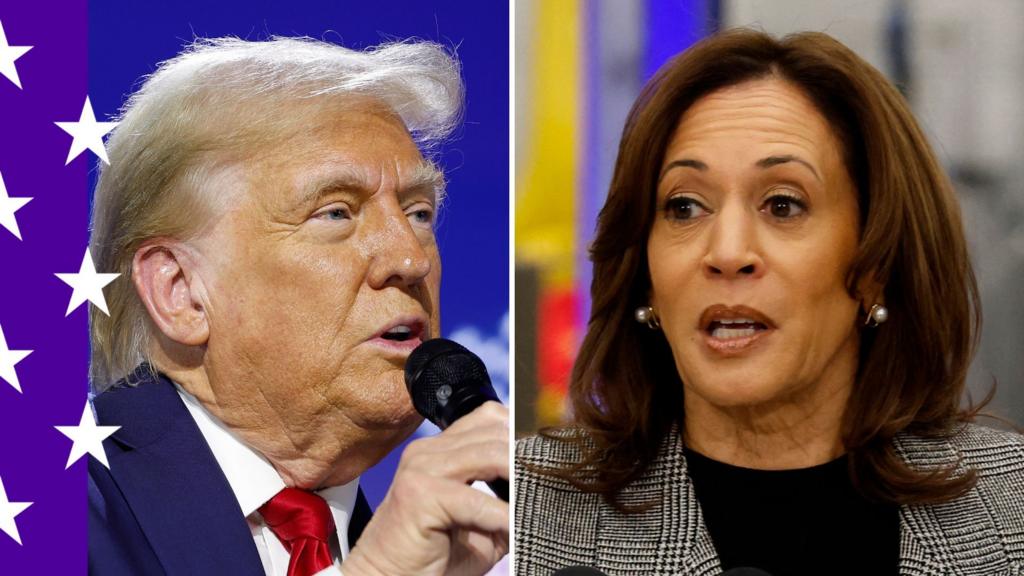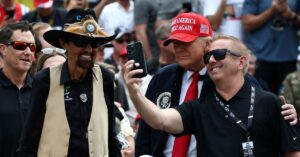
Vice President Kamala Harris and former President Donald Trump made a series of dueling campaign stops in the key battleground states of Wisconsin and Michigan on Nov. 1.
With the election just days away, the contest remains close. Polling averages on Oct. 31 showed Trump just barely ahead by 0.3 percent nationwide, but Harris is up by 0.3 percent in Wisconsin, and 0.8 percent in Michigan.
Biden narrowly took Wisconsin by just over 20,000 votes in 2020; he enjoyed a more comfortable victory in Michigan: 50.6 percent to 47.8 percent.
Harris recently campaigned in Madison, Wisconsin, on Oct. 30 in a rally that featured Mumford and Sons; Trump visited Green Bay the same day.
Both candidates are clearly fixed on clinching the all-important 25 combined electoral votes of the Badger State and the Wolverine State.
Harris’s first stop in Janesville, Wisconsin, was aimed squarely at union members across the nation.
Harris was flanked on stage by members of the International Brotherhood of Electrical Workers, which endorsed her in July.
“Here in Janesville and across our nation, union members have helped lead the fight for fair pay, better benefits, safer working conditions and every person in America benefits from your work,” she said. “I tell people everywhere I go, thank a union member” for benefits like the five-day work week, sick leave, and paid vacations.
Harris said she will oppose “union-busting” legislation, and pass the Protecting the Right to Organize Act, pro-union legislation.
By contrast with the electrical workers union, last month, the International Brotherhood of Teamsters labor union’s refusal to endorse her—or Trump. It was the first time they had refused to endorse a candidate since 1966, but the group’s internal Sept. 15 polling showed that its members support Trump over Harris 59.6 percent to 34 percent.
Harris also vowed to invest in manufacturing infrastructure to boost job growth.
She said on her first day in office, she would issue an executive order removing the college degree requirement for federal jobs and would urge similar action in the private sector.
Harris’s second stop, Appleton, was preceded by remarks from Sen. Tammy Baldwin (D-Wis.) who briefly made her own case against GOP challenger Eric Hovde. Her speech mirrored her comments in Janesville—and elsewhere over the last few months.
Leaving no demographic untouched ahead of the neck-and-neck race, Harris made a pitch to young people, saying that she was proud of Gen Z voters and that they were “rightly impatient for change.”
Harris also vowed to make abortion legal in all fifty states if elected, promising to sign such a bill into law if it passed Congress.
Milwaukee’s rally was preceded by a performance by 1990s-pioneering female rapper MC Lyte, and a speech by modern rapper Cardi B. Her remarks in Milwaukee echoed those in Appleton.
Trump Stumps Michigan
Former President Donald Trump courted two key constituencies in a pair of events in the critical battleground state of Michigan: Arab Americans and auto workers.
The first stop on Nov. 1 was in Dearborn, the largest Arab-American majority city in the United States, where Trump met with a group of supporters at a restaurant. President Joe Biden won the city by a wide margin in 2020, but Trump has been courting Muslim voters who are angered by the administration’s handling of the conflict in Gaza.
Muslims voted “uncommitted” in large numbers in the state’s Democratic primary election. Leaders of the uncommitted movement declined to endorse Harris but urged their constituents to not vote for Trump. Arab Muslims make up a little less than 3 percent of the state’s population.
Muslim Mayors Bill Bazzi of Dearborn Heights and Amer Ghalib of Hamtramck have endorsed Trump.
Harris told reporters on Friday she is “proud to have significant [sic] amount of support from the Arab American community” and added that she continues to push for a cease-fire between Israel and Hamas and the release of hostages held in Gaza.
The former president traveled from Dearborn to Warren in Macomb County, an area dotted with auto plants and related industries. It was Trump’s second visit to Warren this year.
Robert F. Kennedy Jr. spoke on behalf of Trump at a rally attended by several thousand people at Macomb Community College.
Trump repeated his pledge to reinvigorate the auto industry in Michigan through a system of tariffs on imported automobiles and tax incentives for domestic manufacturers. He was joined on stage by Brian Pannebecker, a retired auto worker and organizer of Auto Workers for Trump, who praised the former president’s commitment to American manufacturing.
Many auto workers believe their livelihood is at stake in this election, Pannecbecker told The Epoch Times. “We’re on the very brink of not existing as a domestic auto industry anymore,” he said.
The United Auto Workers union endorsed Harris, who has promised to boost the Michigan industry by investing in manufacturing and creating good-paying union jobs.
Both vice presidential candidates also barnstormed through the state on Nov. 1. Trump’s running mate, Sen. JD Vance (R-Ohio), held a midday rally in the West Michigan city of Portage. Harris’s running mate, Gov. Tim Walz of Minnesota, held events in Detroit, Flint, and Traverse City.
Harris has held a small lead in an average of national polls reported by FiveThirtyEight, though it has narrowed from 3.4 percent in late August to less than 1 percent on Nov. 1.
Nearly 2.6 million of the state’s 7.26 million active registered voters cast their ballots by Nov. 1.
Absentee voting began in Michigan on Sept. 26. Early voting began in Detroit on Oct. 19 and statewide on Oct. 26. Early voting ends on Nov. 3.
Trump Pivots to Wisconsin
At Trump’s rally in Milwaukee, held at the same time as Harris’s, he told supporters that he has been campaigning for 62 days straight, and now “the fate of this nation is in your hands.”
“We’re gonna win it big, and I’d love to win it right here,” in Wisconsin, he said. The Badger State played a key role in his 2016 presidential win—and in his 2020 loss to then-candidate Joe Biden.
Trump spoke for nearly an hour and a half to supporters who mostly filled the 17,500-seat Fiserv Forum—the same site where he and Vance accepted the Republican Party’s nomination for president and vice president this summer.
Now Trump said he is asking for citizens’ votes, but he wants people to know: “Whether you vote for me or not, when I win, I will fight for you with every breath in my body.”
Trump offered his “closing argument”: He loves America and is inviting everyone to join him in building “an extraordinary future for our nation.” He reiterated pledges he has made throughout the 2024 campaign, including promising to boost the economy and tighten the U.S.–Mexico border to block illegal immigration.
Prior to Trump’s remarks, Brian Schimming, Wisconsin GOP chair, pointed out that Trump and Vance made history in the Badger State with their nominations—and he said the state could make history again by flipping back into the Republicans’ win column.
Former Wisconsin Gov. Scott Walker asked rallygoers to make a pledge to contact 47 people about voting to make Trump the 47th president.
“Make sure they know that life was better when Donald Trump was president,” Walker said.
“We’re rounding the turn,” Trump said, acknowledging people who have attended dozens or hundreds of his events, including a group of ladies from North Carolina and “the Front-Row Joes.”
The former president has set a flurry of campaign stops, mostly in swing states to close out his campaign. On Nov. 2, he is scheduled for two stops in North Carolina and a third in Virginia. On Nov. 3, Trump will rally in Pennsylvania, North Carolina, and Georgia. On Nov. 4, the former president is slated for four appearances: two stops in Pennsylvania and one stop each in North Carolina and Michigan.
His Election Day schedule has not yet been announced.





